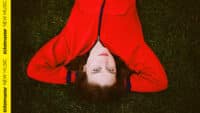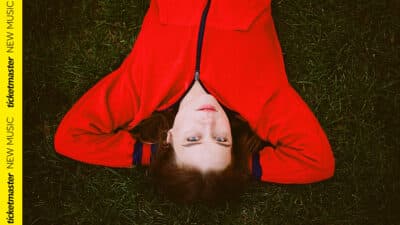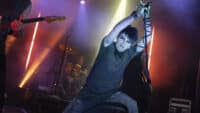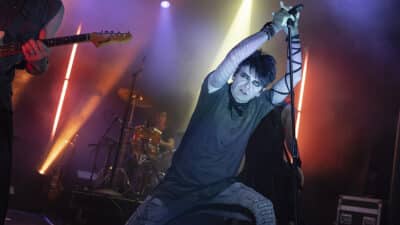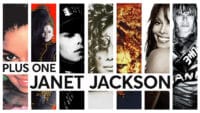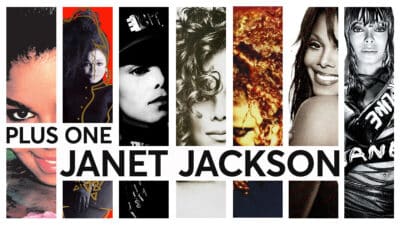Interview
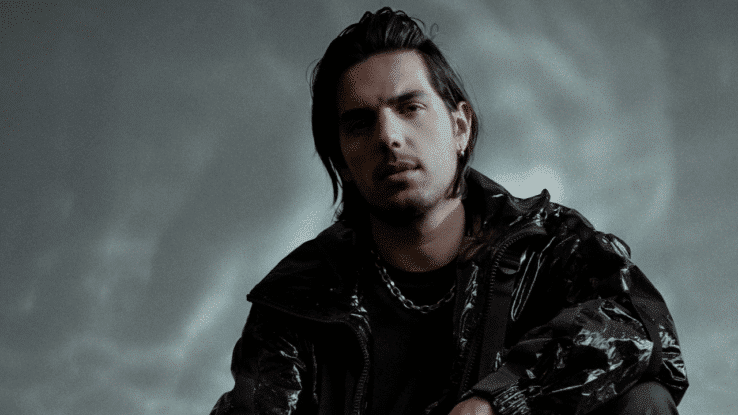
Interview
Apashe: “I’m drawn to composing things that sound like the theme song for the bad guy in a movie”
Electronic producer Apashe on his latest album, touring, and growing up in Brussels
What happens when dark electronica and classical music collide? Throw in a brass orchestra, avant-garde visuals and incredible guest vocalists, and you’ve got yourself an Apashe show.
Belgium-born, Montreal-based John De Buck has been releasing music under his Apashe project for over 10 years, gradually introducing his classical influences to his neurofunk, trap and dubstep-fuelled fanbase. The foundations of his latest album, Antagonist, are based on four classical compositions he’s now preparing to release.
An artist who is always operating at full capacity, Apashe recently toured the US, performed a stack of New Year’s shows, and also has a documentary in the works. Meanwhile, his cinematic productions continue to garner global acclaim. Apashe’s music has featured in numerous films and TV series, including John Wick, Succession, Iron Fist, Fast & Furious and The Boys.
With an upcoming gig at London’s KOKO this Friday, we spoke to the electronic music maestro to discuss everything from going to drum ‘n’ bass raves as a 14-year-old to jumping on a plane to Mongolia and filming “Lord Of The Rings on a budget” – AKA his latest music video, ‘Humans’.
You’re starting the second leg of your Antagonist world tour and heading to London for a show later this week. What can fans expect?
Right now, we’re in the middle of the tour – we’ve done about 30 shows in the US. I’m trying not to post too much about it because, after 30 shows, there’s footage of it everywhere. So, I think fans know what to expect. I think that also brings them there – they want to experience it live.
But in a more concrete way, people who don’t know can expect a mixture of an electronic music show with a whole brass section orchestra. It’s the duality between classical music – the heavy side of it – and electronic music, as well as some vocal guests popping in and out.
You’ve kept the vocal guests under wraps. They’ve been changing depending on where you are?
Exactly. For the US, there were two who were on tour with us. Right now, for Europe, there is one, but then we have a few collaborators coming in and out. We have one surprise for London, and for other shows we have other people popping in.
What do you enjoy most about touring?
On the latest tour, it’s the fact that we can play as a whole group all together. I’ve spent many years touring as a DJ and I love DJing. But playing with other people is very different. You have exciting moments when everyone is playing together, looking at each other. Seeing the reaction of the crowd is a completely different thing than just being on your decks and mixing. It has its pros and cons, of course, but I think that’s what I’ve liked the most about this tour.
I could see it being lonely sometimes up there as a DJ.
For sure. But the thing that’s cool about DJing is the freedom you have. You can decide what you play next and be completely unprepared.
Genre-blending is such a buzzword for artists these days. But I feel like you have always embodied that. There are hip-hop influences, classical influences, and even a live orchestra now. Are there any genres that you’d like to explore?
Yeah, for sure. I think with this project, maybe not because I feel now what I do makes sense. And the things I would love to explore are so different from what I do as Apashe. In the past, it was a big thing to be like, “hey, what if I released a whole classical music record.” We’re doing it now it now with this album, but it took years to build that with the fans. So, although I’m considered an electronic act and a DJ, I can now proudly say, “I’m going to release a classical piece”, and no one is going to be like, “Whoa, this is so weird. Why is he doing this?” That’s a huge step that I’ve built towards.
But now I can’t, for example, release a cumbia or a bossa nova record. And I think maybe on a different project, that’s something I want to explore. Not necessarily cumbia; I’m joking about that! But there are so many genres that I listen to a lot. Everything that goes with the same register of instruments as classical music – Big bands and small orchestras that were used for jazz back in the 20s, 30s, and 40s. I kind of want to explore that. Going to jazz or to funk, or sometimes even disco, is something I really want to do. But that would be a bit of a stretch for what I’m doing under this project. So maybe I will do it one day with a new one. But we’ll see.
I love to hear that. I’m a big disco fan.
Yeah, me too.
You’re often asked to describe your sound. I know that must be a punishing question for you at this point. But I’ve often heard you use the word majestic. Can you elaborate on what that word means to you?
It [majestic] came about because it was such a pain to describe my sound. When we made the record ‘Majesty’, naturally, people started saying, “Yeah, this is majestic”, and it stuck. I adopted it from fans and started saying everything is just majestic. I feel like it works. It doesn’t really explain the genres that I’ve combined, but the feeling can be explained, you know?
With such a diverse sound, I’m intrigued to hear about your musical influences.
Oh, it changes all the time. I have periods where I deep-dive into composers. But I think over the last few years, on one side I’m keeping up with all the new interesting acts that manage to make electronic music still intriguing for me. New kids that come out of nowhere and either go back to the roots or just keep innovating. For example, NightFunk and Imani. I’ve always been a big fan of Noisia. Recently, guys like Hamdi, who are bringing back an old-school UK vibe that I like.
Then on the other side, what I listen to a lot and what directly influences my compositions are the more classical composers. Last year, I had a big John Williams period – except for the Star Wars record, I’m not really into it. I’ve had a huge Tchaikovsky period; I would even say a Russian period, where I listened to the old Romantic era and beyond. Right now, I’m going back to Bach. That’s a funny sentence, “going back to Bach”! [laughs]
These guys had such long careers. They were composing stuff for 30-40 years. So, the range of compositions is so wide. It’s like an endless rabbit hole where you can just dig in. There’s so much cool stuff. And I’ve been in the hole for a while now, chasing all the really dramatic, sad, dark things they’ve done. They would often write for the church because they were financing it. And the church was always trying to make joyful, uninteresting things, in my opinion. But some of it came out really nice. So, baroque era composers. I can keep on going like this forever… There are a lot of composers that really excite me.
You can definitely hear that dramatic, darker sound on Antagonist.
Oh, for sure. I mean, that was the whole goal of that album, too. I realised that I’m drawn to composing things that sound like the theme song for the bad guy in a movie. So, I decided to spend a whole album dedicated to that.
That’s one hell of a catchline. Let’s talk more about Antagonist. If you had to pick one, what’s your favourite track on the album?
It kind of changes, you know, depending on the mood. I think it’s ‘Catch Me’, but at the same time, I also really love the ones that no one likes, you know, like ‘Rise At Nightfall’. I say no one likes it because it’s the least streamed right now, but I really like it. But I think it’s ‘Catch Me’ because I don’t know… There’s something weird about ‘Catch Me’ that I really like. It’s uncommon. Also, maybe ‘Devil May Cry’.
Obviously, sonically, Antagonist is this hybrid between electronic and classical influences, and thematically, it’s about this “Antagonist”, or as you just eloquently described, the soundtrack for the bad guy. Can you tell me more about this overarching concept and your creative process behind the album?
I guess on a more detailed or deeper level, it’s a follow-up of Renaissance, my previous album, where I didn’t really know what I was doing, but I wanted to try things. I did a lot of things right, and I did a lot of things in a messy way. I felt like there was still so much to be explored. With all the things that I learned, I wanted to have another try at it.
Also, like I was saying, I went deep into John Williams and his use of textures and how he combines certain instruments. For me, Antagonist was a big exploration of texture. I’m really obsessed with sound design in general, with synthesisers and granular synthesis and a bunch of geeky things that you can do with a computer. That research in texture with real instruments is like sound design. Like how you can combine different instruments with different notes to have a new texture that surprises you. For me, that was an acoustic way of doing sound design. This album was researching that.
Speaking of sound design, in the early days of your career, you co-produced the sound design for many video games, including Assassin’s Creed and Watchdog. The Apashe sound is very cinematic. You’ve got these unbelievable visuals, knighting ceremonies, and these Easter eggs that link between the projects. Do you think your sound work on video games played a part in how you tell stories and make music today?
Now I look back at it; it was a really short period of my career. Just two years early on. But it influenced me a lot because it was at the beginning of my career, when you’re laying down the foundations of who you become. You know, the younger you are, the more it affects you. I think I learned more in those two years than I did in the last ten. It was purely sound design, no music. I was just working on SFX and trailers. The approach is a bit different. It was telling a story with just sounds.
I think that when you work on sound design and trailers, specifically for video games, you get good at creating tension with sounds, and that definitely influenced me because I still have that in my music. I guess that’s why my music is still used for a lot of trailers today. We just did Monkey Man with Jordan Peele. It’s still very present in my work, and that came from back then.
I wanted to ask you about all the movies and shows your music has been featured on. There’s The Boys, Succession. The list is enormous. Do you have a feature you’re really proud of or feel represents your music?
That’s a good one. There are specific ones that I enjoy because I ended up watching them, and I’m like, “What is this?”. I think John Wick 2 was when I was still really excited about John Wick. So that, for sure. I didn’t know The Boys, and then because they used my music, I started watching the TV show, and I was like, “Oh, this is actually sick”, and I really liked that.
Then I would say Succession. I also had no idea what Succession was, and they’d already used my music, and then it ended up becoming one of my favourite TV shows ever. It’s not on brand in a way, you know; it’s not like an action thing, it’s just rich kids trying to get money out of their rich dad in a really f*cked up way, but the TV show was just amazing. And yeah, I was proud to be part of that.
Belgium has a strong electronic music scene. What was it like growing up there?
That was the foundation of everything for me. I used to dance a lot. I used to do ballet and a bunch of stuff. So, in a way, I was already in the classical music world, aside from playing instruments very early on. But then, at the age of 13-14, living in Brussels, being a kid, skating and doing a bunch of really contradicting activities – I was drawn to the drum and bass scene, which turned into the breakcore scene, which turned into the hardcore scene. I went down a rabbit hole.
I went out at a really young age, probably an age that people in North America will never be able to understand because they usually go to raves at 21 when they can start drinking. I feel like the UK is the same [as Belgium]; it’s not that uncommon to see a 14-year-old kid at a drum and bass rave; it happens. That was my case in Brussels. And I think that really shaped what I do today. As a teenager, I wasn’t just listening to hip hop or the mainstream stuff that all the normal kids were listening to, I was drawn to the most underground things I don’t even honour today, but it affected me.
Brussels pushed me into that scene. When you’re a teenager in those cities, being ‘cool’ means going to the most underground, raw places. And for sure, that’s part of who I am now. Strangely enough, there’s a bunch of kids from that scene that are now artists today that I come across. And it’s funny because we all look at each other like, ‘Oh, we know what happened back in these, like, caves 15 years ago…’ and no one else will understand.
The Belgium bass scene’s secret society… Collaborating is a core part of the DNA of your music. You’ve worked with some incredible artists. Tell me how your recent collaborations with artists like Busta Rhymes and Flux Pavilion came about?
With Busta, I’ve always been a huge fan. He’s been on the bucket list for more than a decade, but not in a realistic way. You know, it’s more like I imagined doing something with Busta. But then things kept growing. And for this album, we wanted to try to get some big features. So, we came back to that bucket list. And we’re like, okay, what is realistic? We realised that Busta is on the same agency as I am in the US, so we had an email. We thought, let’s shoot our shot. And they were really into it. They saw the visuals and the music videos we’ve done, and I think they found it funny. That was the first exchange, like “Oh, this is funny. We like it”. We asked if he would be interested in doing a feature and yeah, we ended up doing that song.
But out of a miscommunication, he actually started writing on another song. And because it wasn’t the right one, he did the second one after that. But we still have the first one. One day he called me. I remember I was in San Francisco, right before the shows; I was really busy. I picked up, and I realised it was Busta Rhymes on the phone saying, “Yo, what’s happening with the other song? We need to release this”. I was like, “What the f*ck?”! [Laughs]. Anyway, we have a second one, and I hope it will see the light of day.
Sounds like Busta wants it to see the light of day.
I also really like the song. It was supposed to be on the album, but I couldn’t finish it on time, and there were some other complications.
Then, with Flux, obviously Flux and I have been in the same scene for many years. I got to meet him much later. But, he’s like the dubstep don, like the guy that has always been there. I remember hearing his songs when I was 17-18. So when we started talking of course I was down to work with him. We sent each other a few demos back and forth over time. I tried to do something with Joey Valence and Brae, the rappers featured on ‘Fracture’. Then, it became like a triangle of bouncing back ideas. Eventually, ‘Fracture’ came up.
What other artists are on your bucket list?
I want to try to do something with Danny Elfman one day. Just because of all the fairly recent movie composers, I think he’s the one who has influenced me the most. He’s from the same generation as Hans Zimmer, but he’s much darker and more intricate. I just really like his style and would be curious to see what we could come up with together. Obviously, I would kind of feel like a fraud next to him, but I’m just a huge fan, so I would love to do it. Otherwise, on that bucket list – I can name so many – A$AP Rocky, Kendrick Lamar, all the people I love to listen to. Lately, I’ve been listening to a lot of Rosalía. Bucket lists are endless things.
It’s interesting hearing you talk about movie composers. Is that something you imagine doing later down the track?
Yeah, I would, for sure. I’d love to do that. That’s the next thing I want to start working on slowly. I realise the more my Apashe project works these days, the less time I have. So, I couldn’t accept a contract like that right now. Just because touring and just making my records is already a challenge. But later on, when touring naturally fades away, [movie composing] will replace it. At least, that’s my goal.
Music videos are a massive part of the Apashe brand; they’re intrinsically linked to the world you build for your fans and are often better described as short films. What music video are you proudest of?
The most proud of? That’s also something that depends on the day and the mood. I recently rewatched ‘The Witch’, the one we shot in Ukraine. And I feel like there was a weird, cool vibe in that one that can’t be described, nor could we have prepared. It just kind of magically happened. Alina Pash, the singer, played a big role in that. Otherwise, the latest one, ‘Human’, just because it’s complete nonsense. All the shots, especially towards the end, are stupid.
So outrageous.
I still can’t believe we pulled that one off.
You travelled to Mongolia to film it, right? How did it all happen?
Long story short, the director I work with – Adrian [Villagomez] – had shot there once for a documentary. He had a few contacts. And he wanted to go back. But you know, when you do music videos, not every artist is down to travel all the way to Mongolia. But if you ask me that kind of question, I’m the kind of person who’s going to say, “Yeah, let’s go tomorrow. I’m in”. So, we started brainstorming about what he knew was available there. And we shaped the music video around that.
Mongolia is a land where you have massive, beautiful, red deserts in certain areas and in other areas; you have horses everywhere. Everyone rides horses there, everyone. They’re all in the wild. And sometimes they’ll go grab it, ride it, and leave it there. It’s a different world. So, we knew we could have a lot of riders. We just thought, let’s do Lord Of The Rings on a budget. And if there was one place on earth where we could somehow make it happen, it was going to be there.
Final question. You’ve currently got your hands full with the tour, but can you tell me what’s on the horizon for Apashe in 2024?
Well, During the process of Antagonist, I composed four classical pieces. And then I took those classical pieces, and I remixed them. Basically, Antagonist is the remix of those classical pieces. So now it’s going to be time to release the classical pieces that are behind the project. So, that will come up. And I want to add a few features, like some guests and an opera singer.
Then there’ll be some real remixes of the remixes. I’m going to ask a bunch of friends and other producers to remix my songs and see what comes out of it. In the past, this has been very successful. When people with different minds take my stuff they make amazing things. And then, at the same time, we’re preparing probably the biggest shows we have ever done, including some one-offs; I would like to pull a symphonic orchestra. That’s in the plans. And to just keep making things more impressive and more fun.
Apashe is playing KOKO in Camden on Friday 2 February. Find tickets here.




